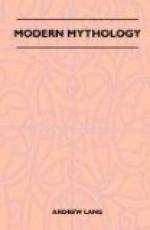CONCLUSION
Here ends this ‘Gentle and Joyous Passage of Arms.’ I showed, first, why anthropological students of mythology, finding the philological school occupying the ground, were obliged in England to challenge Mr. Max Muller. I then discoursed of some inconveniences attending his method in controversy. Next, I gave a practical example, the affair of Tuna and Daphne. This led to a comparison of the philological and the anthropological ways of treating the Daphne myth. The question of our allies then coming up, I stated my reasons for regarding Prof. Tiele ‘rather as an ally than an adversary,’ the reason being his own statement. Presently, I replied to Prof. Tiele’s criticism of my treatment of the myth of Cronos. After a skirmish on Italian fields, I gave my reasons for disagreeing with Mr. Max Muller’s view of Mannhardt’s position. His theory of Demeter Erinnys was contrasted with that of Mr. Max Muller. Totemism occupied us next, and the views of Mr. Max Muller and Mr. J. G. Frazer were criticised. Then I defended anthropological and criticised philological evidence. Our method of universal comparison was next justified in the matter of Fetishism. The Riddle Theory of Mr. Max Muller was presently discussed. Then followed a review of our contending methods in the explanation of Artemis, of the Fire-walk, of Death Myths, and of the Fire-stealer. Thus a number of points in mythological interpretation have been tested on typical examples.
Much more might be said on a book of nearly 900 pages. Many points might be taken, much praise (were mine worth anything) might be given; but I have had but one object, to defend the method of anthropology from a running or dropping fire of criticism which breaks out in many points all along the line, through Contributions to the Science of Mythology. If my answer be desultory and wandering, remember the sporadic sharpshooting




